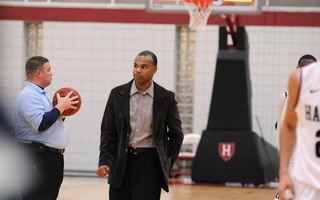A huddled audience in a jam-packed Sanders Theatre first met Ira Glass in complete darkness. Sitting alone on stage with all the lights off for the first five minutes of his lecture, the beloved National Public Radio (NPR) talk show host and creator of “This American Life” discussed the power of merely listening to a voice. Having started the night with creativity, originality, and poignancy, Glass joked, “you know, you look different than I expected too,” when the room finally brightened for the rest of his 90- minute program.
As part of the Celebrity Series of Boston, Glass’s Saturday evening lecture entitled “Radio Stories and Other Stories” explored the method and ideology behind his storytelling and concluded with a 10-minute question-and-answer session. With two CD players beside him—one for prerecorded quotes and another for background music—the night’s event unfolded almost like an episode of “This American Life,” as Glass interrupted his talk with personal anecdotes and played examples from the show.
The thin, scruffy radio personality said that when he first created his show in 1995, he wanted to inject journalism with all the things that makes life worth living—pleasure, humor, discovery, and joy. With the philosophy that reporters should depict the world as it is, Glass revealed that he often gathers stories from fan mail and listeners and connects them with weekly themes such as “Post-9/11 Experiences” or “What My Parents Pitched.”
Glass emphasized the importance of structure to his work. “All you need is the forward motion of action and the audience will wonder where we’re going,” he said. According to Glass, building suspense simply involves providing a sense of destination, with the narrator saying “this happened, and then this happened,” and so forth. Glass said this technique extends beyond radio, and was used by his childhood Rabbi and even by Jesus in sermons and parables.
Laughter permeated the venue throughout the night as Glass provided illustrations of this method of narrative construction. One audience favorite was an anecdote in which a war veteran named Peter dumped his dead wife’s ashes in the parking lot of the Lincoln National Center after discovering that the supposedly free, government-sponsored cremation actually involved a $16 service fee. On the surface, the story is ridiculous and shockingly amusing, but Glass discussed how the beauty lies in its deeper meaning. As an allegory for how the World War II generation once put their faith in the government, Glass called the story “profoundly relatable.”
Although the stories on his show are almost always left-field and unexpected, Glass took the time to address how creativity and inspiration are really just products of hard work. He said that early on in his career, he was relieved to learn that there is no magic or fairy dust involved in compelling storytelling. Oftentimes, his NPR staff will research 25 stories just to find three or four captivating ones to use. “You can lightning strike every week if you just wander around long enough in the rain,” Glass said.
Aside from all the jokes and stories, which involved everything from midgets to musicians, Glass also revealed a more serious side to his character. Offering his opinion on the current status of journalism, he said that in order to revive news broadcasting, factual reporters have to steal the aesthetics of opinion-makers like Jon Stewart and FOX News. Furthermore, he said radio can educate listeners about pressing issues like healthcare and the death of the car business while still establishing an emotional connection to the rest of the world. Glass noted that when he interviewed Sunni and Shiite Muslims, or ex-prisoners from Guantanamo Bay, he asked basic, heartfelt questions concerning their everyday thoughts, habits, and lifestyles.
For the most part, the audience was receptive to Glass’s lecture. Long-time NPR listener Amy E. Kenney liked hearing Glass deconstruct the thoughts behind his show. “I always thought he could make anything interesting, and I liked knowing that there’s a method behind the madness,” she said. Audience member Jason Schneider was also pleased with the lecture. “Radio is often so personal,” he said. “You don’t usually get to hear the laughter of the entire crowd, so it was nice to be in a place where you can feel the camaraderie.”
Glass gave the audience one final united laugh as he answered the question “Where do you see yourself in five years?” by joking, “I’ll be teaching Macroeconomics on this stage … but really, no, I don’t have any other skills, so I’m kind of stuck with what I’m doing now.”
Read more in Arts
Channing Tatum Not Afraid to Fail EarlyRecommended Articles
-
The FaçadeVENICE, Italy — He’s been a glass-blower for the last ten years. Specializing in beads, he now teaches the skill
-
 Bartley's Window Smashed
Bartley's Window Smashed -
Scientists Discover New Cell PatternsHarvard researchers have recently discovered that cell migration can be modeled after the movement of colloidal glass—a finding that could have significant implications for future medical research.
-
Exhibit Captures Spring’s Vibrant EnergyDale Chihuly's new blown-glass exhibit at the MFA captures the vivid energy and exuberance of spring.
-
 LIVE BLOG: Men's Basketball Tied With Holy Cross, 34-34, at Halftime
LIVE BLOG: Men's Basketball Tied With Holy Cross, 34-34, at Halftime -
Preview: The Glass MenagerieFebruary 2 through March 17













